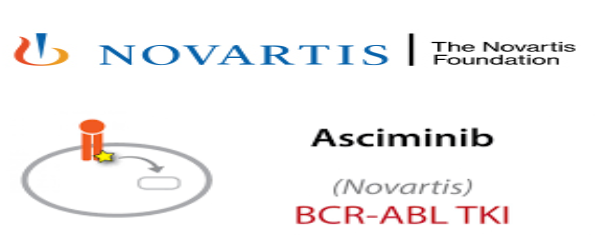Keypoints:
- The FDA granted accelerated approval to Asciminib for the treatment of patients with Philadelphia chromosome-positive chronic myeloid leukemia for 2 indications.
- Scemblix provides a much-needed and long-awaited new options for patients with chronic myeloid leukemia (CML) who suffer with intolerance or inadequate response after at least two previous tyrosine kinase inhibitor (TKI) treatments.
- The Philadelphia chromosome was the first recurrent genetic alteration found to be associated with a specific human cancer, chronic myeloid leukemia (CML). It was first identified as an abnormally small chromosome in cells of CML.
- In the pivotal Phase III ASCEMBL trial, Scemblix demonstrated significant and clinically meaningful superiority in major molecular response (MMR) rate vs. Bosulif®* (bosutinib) (25% vs. 13%) at 24 weeks, and more -than -three times lower discontinuation rates due to side effects (7% vs. 25%).
- Additional Phase I data in patients with CML with the T315I mutation supported the FDA approval for a second indication in this patient population4
- With a new mechanism of action known in scientific literature as a STAMP inhibitor and clinical trials across treatment lines – including in the first-line setting –, Scemblix reinforces Novartis’ two-decade commitment to bring transformative therapies to people living with CML.

Novartis announced that the US Food and Drug Administration (FDA) approved Scemblix® (Asciminib) for the treatment of chronic myeloid leukemia (CML) in two distinct indications.
Novartis announced that the US Food and Drug Administration (FDA) approved Scemblix® (Asciminib) for the treatment of chronic myeloid leukemia (CML) in two distinct indications. The FDA granted Scemblix accelerated approval for adult patients with Philadelphia chromosome-positive CML in chronic phase (Ph+ CML-CP) previously treated with two or more tyrosine kinase inhibitors (TKIs), based on major molecular response (MMR) rate at 24 weeks; and full approval for adult patients with Ph+ CML-CP with the T315I mutation. In accordance with the Accelerated Approval Program, continued approval for the first indication may be contingent upon verification and description of clinical benefit from confirmatory evidence. Scemblix is the first FDA-approved CML treatment that works by binding to the ABL myristoyl pocket, and represents an important development for patients who experience resistance and/or intolerance to currently available TKI therapies. Also known as a STAMP inhibitor in scientific literature, Scemblix is being studied across multiple treatment lines for CML-CP, including the ASC4FIRST Phase III study evaluating Scemblix as a first-line treatment.
“The introduction of TKIs twenty years ago revolutionized treatment for CML; however, there remain many patients who do not respond adequately to at least two available treatments and often experience challenging side effects that add a burden to their daily lives,” said Lee Greenberger, Chief Scientific Officer at The Leukemia & Lymphoma Society. “The approval of Scemblix may offer hope to patients by addressing gaps in CML care.”
For many patients, current treatment for CML may be limited by intolerance or resistance, and sequential use of available TKIs is associated with increased failure rates. In an analysis of patients with CML treated with two prior TKIs, approximately 55% reported intolerance to previous treatment. Additionally, a pooled analysis in the second-line setting showed that up to 70% of patients are unable to achieve major molecular response (MMR) within two years of follow-up. Moreover, patients who develop the T315I mutation are resistant to most available TKIs, leaving them at an increased risk of disease progression.
“CML can be difficult to treat when currently available treatments fail patients, when treatment side effects cannot be tolerated, or sometimes both,” expressed Dr. Michael J. Mauro**, Hematologist and Myeloproliferative Neoplasms Program Leader at Memorial Sloan Kettering Cancer Center (MSK). “The addition of Scemblix into the CML treatment landscape gives us a novel approach to combat this blood cancer, helping address clinical challenges in patients struggling after switching to a second treatment, as well as in patients who develop the T315I mutation and face significantly worse outcomes.”
The FDA approval of Scemblix is based on results from the Phase III ASCEMBL trial and a Phase I (NCT02081378) study that included patients with Ph+ CML-CP with the T315I mutation.
In patients with Ph+ CML-CP who had experienced resistance or intolerance to at least two TKIs, the ASCEMBL trial showed that.
- Scemblix nearly doubled the MMR rate vs. Bosulif® (bosutinib)* at 24 weeks (25% vs. 13% [P=0.029])
- The proportion of patients who discontinued treatment due to adverse reactions was more than three times lower in the Scemblix arm (n = 156) vs. patients in the Bosulif arm (n = 76) (7% vs. 25%)
- The most common (incidence ≥ 20%) adverse reactions and laboratory abnormalities in the Scemblix arm were, respectively: upper respiratory tract infections and musculoskeletal pain; decrease in platelet and neutrophil counts, decrease in hemoglobin; increase in triglycerides, creatine kinase and alanine aminotransferase (ALT)
“After more than two decades of reimagining CML care, we continue to boldly push the boundaries of innovation to transform the standard-of-care and help even more patients living with this disease,” said Susanne Schaffert, PhD, President, Novartis Oncology. “We would like to thank all those who have been involved in helping to advance this new and important breakthrough.”
What is Chronic myelogenous leukemia?
Chronic myelogenous leukemia (CML), also known as chronic myeloid leukemia, is a cancer of the white blood cells. It is a form of leukemia characterized by the increased and unregulated growth of myeloid cells in the bone marrow and the accumulation of these cells in the blood. CML is a clonal bone marrow stem cell disorder in which a proliferation of mature granulocytes (neutrophils, eosinophils and basophils) and their precursors is found. It is a type of myeloproliferative neoplasm associated with a characteristic chromosomal translocation called the Philadelphia chromosome.
CML is largely treated with targeted drugs called tyrosine-kinase inhibitors (TKIs) which have led to dramatically improved long-term survival rates since 2001. These drugs have revolutionized treatment of this disease and allow most patients to have a good quality of life when compared to the former chemotherapy drugs. In Western countries, CML accounts for 15–25% of all adult leukemias and 14% of leukemias overall (including the pediatric population, where CML is less common).
What is Tyrosine kinase inhibitor?
A tyrosine kinase inhibitor (TKI) is a pharmaceutical drug that inhibits tyrosine kinases. Tyrosine kinases are enzymes responsible for the activation of many proteins by signal transduction cascades. The proteins are activated by adding a phosphate group to the protein (phosphorylation), a step that TKIs inhibit. TKIs are typically used as anticancer drugs. For example, they have substantially improved outcomes in chronic myelogenous leukemia. They have also been used to treat other diseases, such as idiopathic pulmonary fibrosis.
They are also called tyrphostins, the short name for “tyrosine phosphorylation inhibitor”, originally coined in a 1988 publication, which was the first description of compounds inhibiting the catalytic activity of the epidermal growth factor receptor (EGFR).
What is Philadelphia chromosome?
An abnormality of chromosome 22 in which part of chromosome 9 is transferred to it. Bone marrow cells that contain the Philadelphia chromosome are often found in chronic myelogenous leukemia and sometimes found in acute lymphocytic leukemia.
About Scemblix® (asciminib):

Structure of Asciminib.
Scemblix (asciminib) is indicated for the treatment of adult patients with Ph+ CML-CP pre-treated with two or more TKIs, as well as adult patients with Ph+ CML-CP with the T315I mutation. The first indication is approved under the US FDA Accelerated Approval Program based on MMR rate at 24 weeks; continued approval for the first indication may be contingent upon verification and description of clinical benefit from confirmatory evidence.
Scemblix is the first FDA-approved CML treatment that binds to the ABL myristoyl pocket1. This novel mechanism of action, also known in scientific literature as a STAMP inhibitor, may help address resistance in patients with CML previously treated with two or more TKIs and overcome mutations at the defective BCR-ABL1 gene, which is associated with the over-production of leukemic cells. Scemblix has also been shown to limit off-target activity in pre-clinical studies.
Novartis has initiated regulatory filings for Scemblix in multiple countries and regions across the globe.
Scemblix represents an important development for patients who experience resistance and/or intolerance to currently available TKI therapies, and it is being studied across multiple treatment lines for CML-CP . Specifically, the ASC4FIRST Phase III study (NCT04971226) evaluates Scemblix as a first-line treatment and is in the recruitment phase.
Mechanism of Action (MOA):
Asciminib is an orally bioavailable, allosteric Bcr-Abl tyrosine kinase inhibitor with potential antineoplastic activity. Designed to overcome resistance, It binds to the Abl portion of the Bcr-Abl fusion protein at a location that is distinct from the ATP-binding domain. This binding results in the inhibition of Bcr-Abl-mediated proliferation and enhanced apoptosis of Philadelphia chromosome-positive (Ph+) hematological malignancies. The Bcr-Abl fusion protein tyrosine kinase is an abnormal enzyme produced by leukemia cells that contain the Philadelphia chromosome.
About Novartis Commitment to CML:
Novartis has a long-standing scientific commitment to patients living with CML. For more than 20 years, our bold science has helped transform CML into a chronic disease for many patients. Despite these advancements, we’re not standing still. We continue to research ways to target the disease, seeking to address the challenges with treatment resistance and/or intolerance that many patients face. Novartis also continues to reimagine CML care through its commitment to sustainable access for patients and collaboration with the global CML community.
About Novartis:
Novartis is reimagining medicine to improve and extend people’s lives. As a leading global medicines company, we use innovative science and digital technologies to create transformative treatments in areas of great medical need. In our quest to find new medicines, we consistently rank among the world’s top companies investing in research and development. Novartis products reach nearly 800 million people globally and we are finding innovative ways to expand access to our latest treatments. About 108,000 people of more than 140 nationalities work at Novartis around the world.

